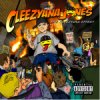| Monday, February 18, 2013 |  |
 |
 |
 |
 |
 |
 
 
 |
 |


 A New Breed of Indie Artists
A New Breed of Indie Artists Free Music and Programs for Radio and Podasters
Free Music and Programs for Radio and PodastersGenius Within Insanity
|
I have only a scant memory of Oscar Levant as an American pianist, composer, author, comedian, and actor. (Wikipedia gives a synopsis of his life.) But thoughts of him came from a song recently received at Audio Graphics' RRadio Music called "The Bridge." Tying the two together are these words from Levant (which have stuck in my head many years now): "There's a fine line between genius and insanity." |
"...if we don't try 'different' then all we'll ever get is 'the same' - and I can't think of anything worse when trying to establish yourself as 'new' by repeating what exists." |
"The Bridge" by Afterthem (from East Brunswick, NJ) was offered as a song at RRadio Music, where internet radio programmers choose music to freely add to their playlists. I listened to "The Bridge" a few times believing that the artist is insane if he thinks this is music. My wife (a classically-trained pianist) paused though and said this as she walked by and heard it: "I kind of like the funk."
I still wasn't sold so I called the group's leader, David George. I wanted to check on what it was I was listening to. Turns out "The Bridge" is about binge drinking, and David George says it's "Electro Grunge."
As someone who believes music is "organized noise," I thought maybe this was genius mixed so close to insanity I was missing it. I'm still not sure that's the case, but our conversation got me thinking.
To someone like myself, a former amateur musician, who's spent the majority of his years listening for and sometimes organizing sounds into commercially viable songs, "The Bridge" was hugely different.
I then had my lightbulb moment: Everything needs to progress, and forward movement isn't always immediately recognized by the masses.
Knowing my tastes, my wife (who spent 17 years at WMMS, Cleveland's "Home of the Buzzard") reminded me that I never would have chosen Bob Dylan on first listen. I remind myself you can add Todd Rundgren, David Bowie and Abba to that list. (I still wouldn't choose Abba, but that's strictly personal.)
Not giving internet radio a chance to become attached to sounds and programming elements which are foreign to how things are done in the radio industry means it is destined to mirror the broadcast radio industry, i.e., by delivering a stream of "sameness" that many people are trying to avoid.
"Afterthem" is different, and it's this "different" that will help internet radio move away from a stodgy terrestrial radio industry. Those who program online need to make moves and draw crowds. People won't gravitate to what they just left, so "different" is required.
To be sure, there is a lot of insanity posing as music. There is also much in the way of insane presenters in the online world of radio. We've reached a time when your ear is needed to pull genius from both groups.
Realizing that not everything created is going to be of genius quality, if we don't try "different" then all we'll ever get is "the same" - and I can't think of anything worse than trying to establish yourself as "new" by repeating what exists.
Insane musicians and programmers are needed to get away from the blandness of what is disguised as radio today. While all music offerings won't be judged worthy of "being discovered," finding one that catches an ear is a satisfying moment - just like when I realized that Bob Dylan is pretty good at what he does.
| Here's a Hip Hop artist to consider: Cleezyana Jones. |
 sample song |
Cleezyana Jones Download Song
|
Give Cleezyana Jones' "Like Winehouse" a listen.
Add it to your playlist, free! Such is the new world of music distribution.
The radio industry had its shot. It's time internet radio programmers take a chance and reach into a huge pile of talent. It is there that new hit songs will increasingly be found.
More Articles
 |
 |
 |
comments by Disqus |

